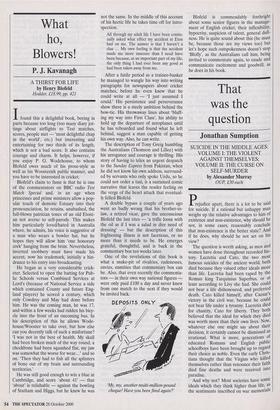What ho, Blowers!
P. J. Kavanagh
A THIRST FOR LIFE by Henry Blofeld Hodder, £18.99, pp. 421 Ifound this a delightful book, boring in parts because too long (too many diary jot- tings about airflights to Test matches, scores, people met — 'most delightful chap in the world', etc.) but interesting and entertaining for two thirds of its length, which is not a bad score. It also contains courage and charm, It helps, however, if you enjoy P. G. Wodehouse, to whom Blofeld owes much of his prose-style as well as his Woosterish public manner, and you have to be interested in cricket.
Blofeld's claim to fame is that he is one of the commentators on BBC radio Test Match Special and, in an age when princesses and prime ministers allow a pop- ular touch of demotic Estuary into their pronounciation, he retains, unabashed, the full-blown patrician tones of an old Etoni- an not averse to self-parody. This makes him particularly loved/hated in Australia where, he admits, his voice is suggestive of a man who wears a bowler hat, but he hopes they will allow him 'one honorary cork' hanging from the brim. Nevertheless, inverted snobbery must have made his accent, now his trademark, initially a hin- drance to his entry into broadcasting.
He began as a very considerable crick- eter. Selected to open the batting for Pub- lic Schools versus Combined Services at Lord's (because of National Service a side which contained County and future Eng- land players) he scored a century, which only Cowdrey and May had done before him. He was the coming man, he was 17, and within a few weeks had ridden his bicy- cle into the front of an oncoming bus. In his description of this he allows Wode- house/Wooster to take over, but how else can you decently talk of such a misfortune? `I was not in the best of health. My skull had been broken much of the way round, a cheekbone had been squashed flat, my jaw was somewhat the worse for wear...' and so on. 'Then they had to fish all the splinters of bone out of my brain and surrounding territories.'
He was still good enough to win a blue at Cambridge, and score 'about 41' — that `about' is relishable — against the bowling of Statham and Higgs, but he knew he was not the same. In the middle of this account of his hectic life he takes time off for intro- spection.
All through my adult life I have been contin- ually asked what effect my accident at Eton had on me. The answer is that I haven't a clue ... My own feeling is that the accident made me more insecure than I need have been because, at an important part of my life, the only thing I had ever been any good at had been taken away from me.
After a futile period as a trainee-banker he managed to wangle his way into writing paragraphs for newspapers about cricket matches, before he even knew that he could write at all — 'I just assumed I could.' His persistence and perseverance show there is a steely ambition behind the bow-tie. His throwaway lines about 'bluff- ing my way into First Class', his ability to hold up the departure of aeroplanes until he has reboarded and found what he left behind, suggest a man capable of getting his own way. Also, he can write.
The description of Tony Greig humbling the Australians (Thomson and Lillee) with his arrogance and courage is thrilling. His story of having to telex an urgent despatch to the Sunday Express from Pakistan, when he did not know his own address, surround- ed by servants who only spoke Urdu, so he could not order a taxi, is a sustained comic narrative that leaves the reader feeling on the verge of the heart attack that eventual- ly felled Blofeld.
A double bypass a couple of years ago went so badly wrong that his brother-in- law, a retired vicar, gave the unconscious Blofeld the last rites — 'a trifle loose with the oil as if I was a salad in dire need of dressing' — but the description of this frightening illness is not facetious, or no more than it needs to be. He emerges grateful, thoughtful, and is back in the commentary box ten weeks later.
One of the revelations of this book is what a snake-pit of rivalries, rudenesses, envies, enmities that commentary box can be. Also, that even recently the commenta- tors — in their own way national figures were only paid £100 a day and never knew from one match to the next if they would be invited back.
My, my, another multi-million-pound cheque! Have you been fired again?' Blofeld is commendably forthright about some senior figures in the manage- ment of English cricket, their inflexibility, hypocrisy, suspicion of talent, general dull- ness. He is quite sound about this (he must be, because those are my views too) but let's hope such outspokenness doesn't stop `Blofly', as the Australians call him, being invited to commentate again, to exude and communicate excitement and goodwill, as he does in his book.


























































































 Previous page
Previous page